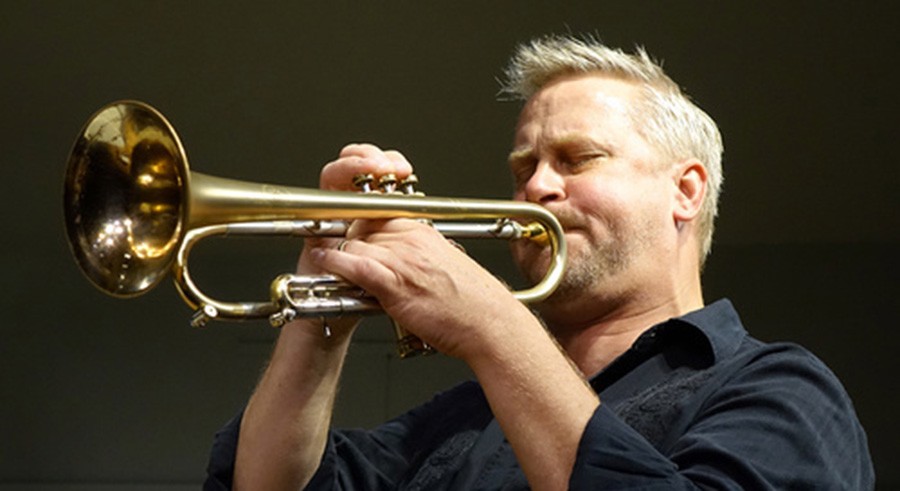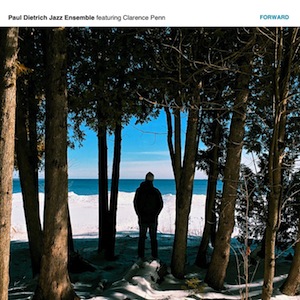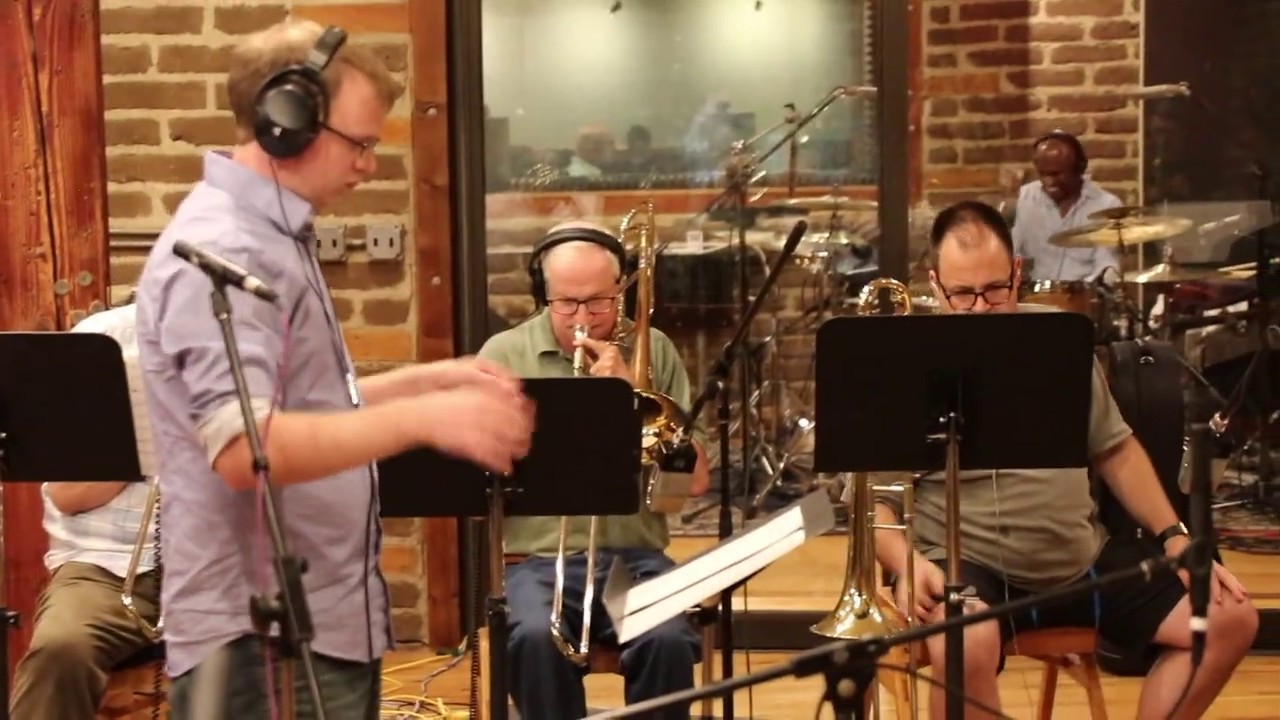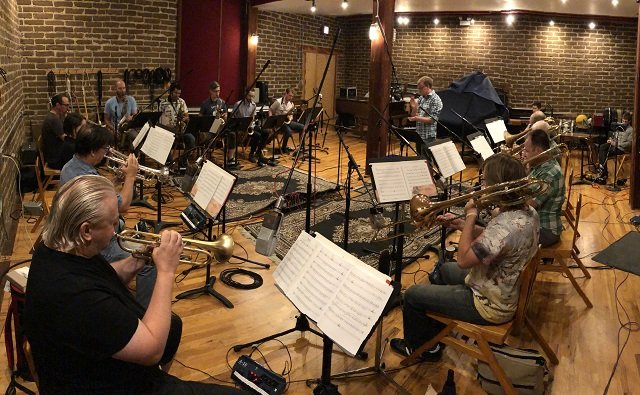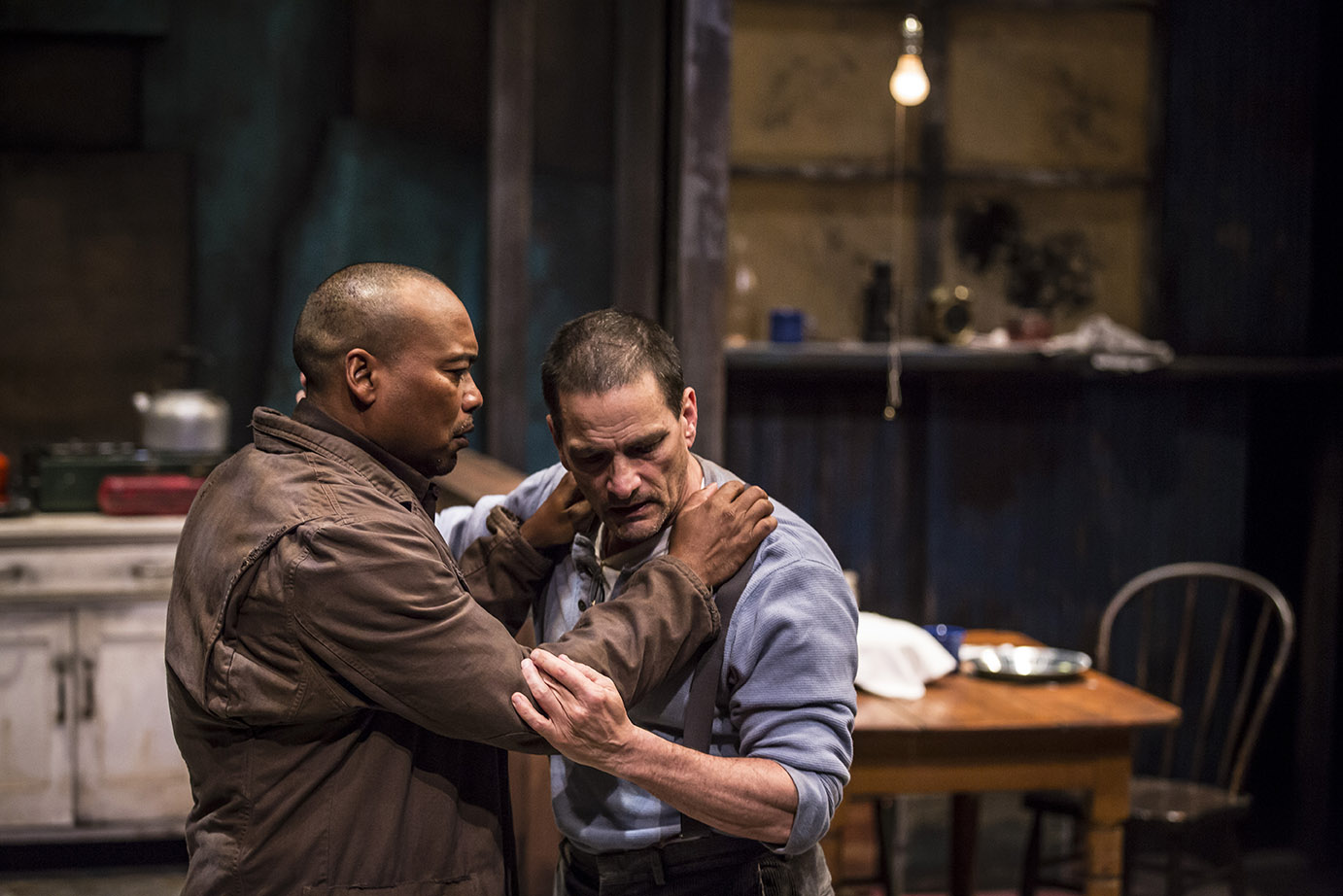
Gavin Lawrence (left) and Jim DeVita play South African half-brothers in Athol Fugard’s “Blood Knot,” currently at American Players Theatre. All photos by Liz Lauren, courtesy APT
Editor’s note: Due to technical difficulties I wasn’t able to insert the link to this review in my last post. So I decided to re-post my review of American Players Theatre’s “Blood Knot.” The review won a silver award for best critical review last week from The Milwaukee Press Club. — Kevin Lynch (Kevernacular).
Blood Knot by Athol Fugard, Touchstone Theater, American Players Theatre, through September 28. For information APT
SPRING GREEN – When you’re born in the heart of darkness you may begin to understand a world’s weird palpitations. The sun sets and darkness does a somersault.
South African playwright Athol Fugard can summon such effects, with brotherly insight and affection. I’ve hardly seen the entirety of August Wilson’s 10-play “Pittsburgh Cycle.” So suffice to say, south of Pittsburgh, Fugard’s Blood Knot captures one of the most complex aspects of the black experience ever dramatically wrought, perhaps in all the modern world.
Overstatement? Surely arguable, but the man’s a candidate for the Nobel Prize in literature for good reason. He turns up the dramatic heat with the slow, laser-focused pressure of a master welder, until the emotional and intellectual impact burns into the viewer’s mind. As per its mission, American Players Theatre offers a classic of modern drama and, at mid-run, they did so Sunday with a one-time, pay-what-you-can price matinee. It’s a professional Theater Guild production, but they want people to see this. It’s well-worth a full-priced ticket.
Regarding our increasingly crazy and disheartening planet, the greater developed world still strives toward liberal democracy. Yet we can get sticky when it comes to political correctness, which typically entails doing the proper thing even though it’s sometimes self-defeating.
I’m wading into that uneasy backdrop, because this play and its casting prove fearless and ultimately correct, in the best senses. Some controversy arose when Caucasian actor Jim DeVita was cast as Morris, one of the two South African brothers barely getting by in a one-room shack in the non-white ghetto near Port Elizabeth.
African-American director Ron O.J. Parson wisely stood by his cast decision. For starters, Fugard’s characters are half-brothers, with the same white mother. More significantly, the play updates the classic Cyrano de Bergerac, wherein a poetical man becomes stand-in suitor for a smitten friend, who’s ill-spoken and ill-suited for wooing a woman. In this case, Fugard boils it down to one brother simply capable of writing, the other illiterate.
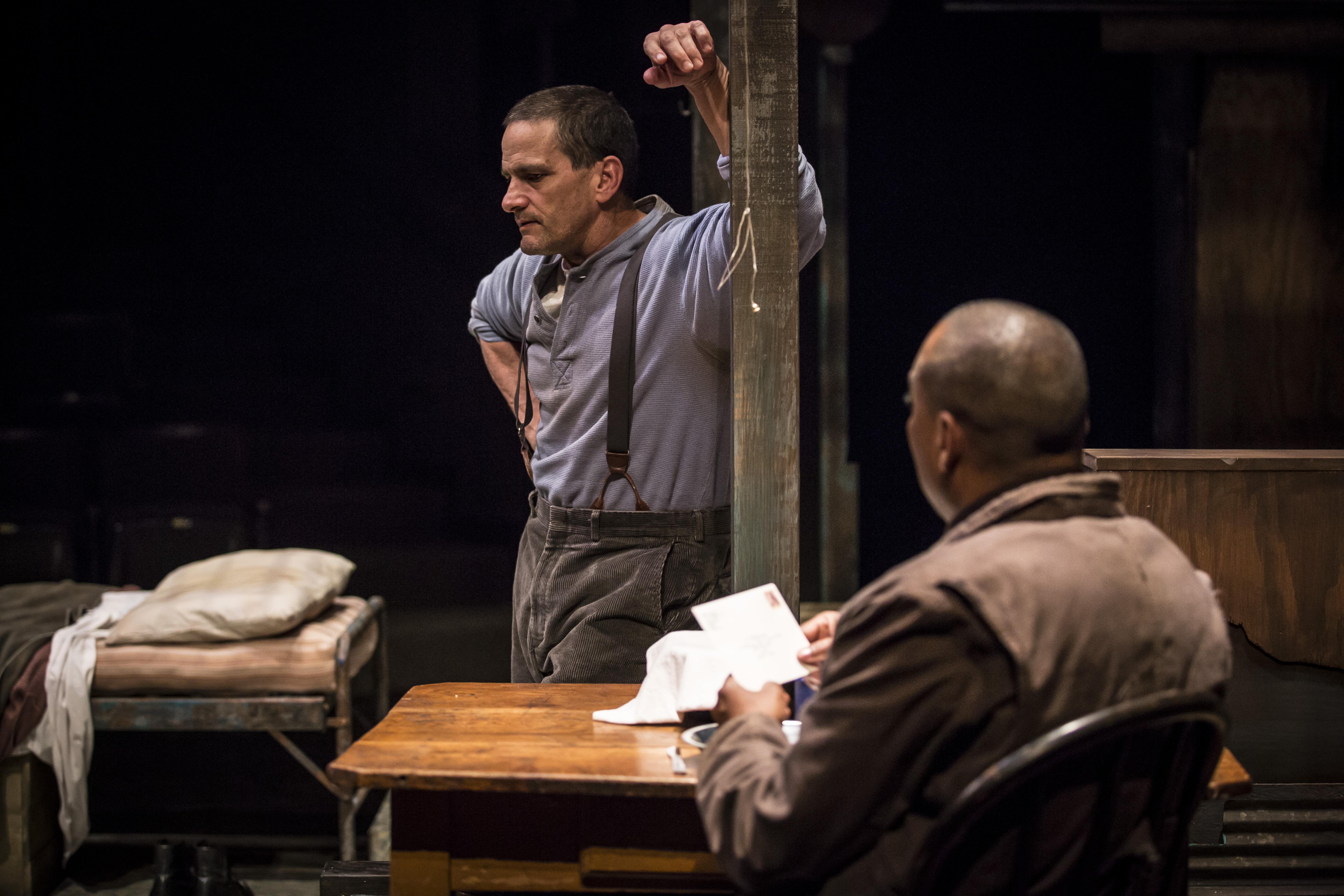
DeVita has actually directed Cyrano and, in that sense, this intensely immersive professional has strong experience with Fugard’s source theme. DeVita also played the title role and later directed perhaps Shakespeare’s darkest character-portrait, Richard III. He’s APT’s preeminent actor, having played Hamlet, Tyrone in A Long Day’s Journey into Night, Eddie in A View from the Bridge and received an NEA Literature Fellowship. Specific credentials aside, he’s a hell of an actor who deftly juggles comedy and drama. He has the sonic range, timing and expressive nuance of a virtuoso violinist.
The white South African playwright himself has said he was actually inspired by his own relationship with his white brother, “and how cruel time had been with him.” So clearly, though the cutting-edge subject matter is clearly race, Fugard aims for the universal.
Make no mistake, Gavin Lawrence proves wonderfully winning, even heart-wrenching, as the illiterate and darker-skinned brother Zachariah. I can’t do full justice to his performance in this context. Further, the actual true progress of P.C. in theater is gender-and-colorblind casting, which far more typically benefits women and actors of color. Yet this white male actor, in final analysis, proved how wise that ideal can be.
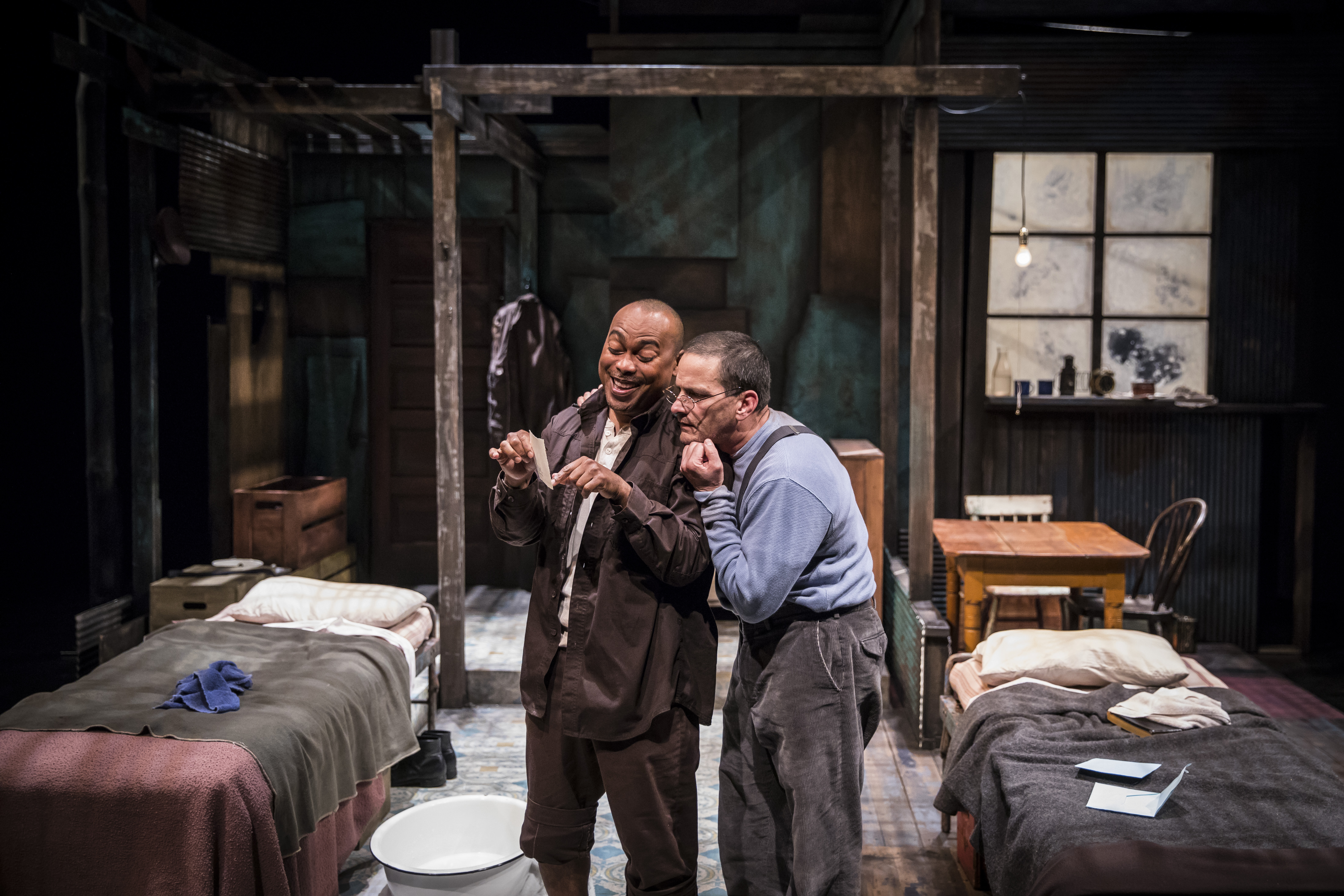
I’m trying to convey the playwright’s mastery of P.C. as social and linguistic subtlety, and regards deeper-seeded matters of brotherhood and, finally, love. This unfolds and sustains superbly with Fugard’s magnificent writing which, with the inevitability of nightfall, casts musical linguistic images in deft shadows, what I would call an ashen lyricism. From seemingly simple images, “the ruins of an old Chevy,” to grander utterances: Zachariah’s “I may be a shade of black, but I will go gently as a man,” or Morris’ mystery-invoking speech at the end.
For sure, this man bears the weight of life’s mysteries. By contrast to his exultant, go-for-it brother, Morris, a seemingly unemployed writer, struggles under a mountain of neurotic and fraternal complexities. Each night, after Zachariah’s shift as a park gate-keeper, the lighter-skinned Morris soaks his brother’s aching feet in epsom salts, a gesture of abject fraternal bond.
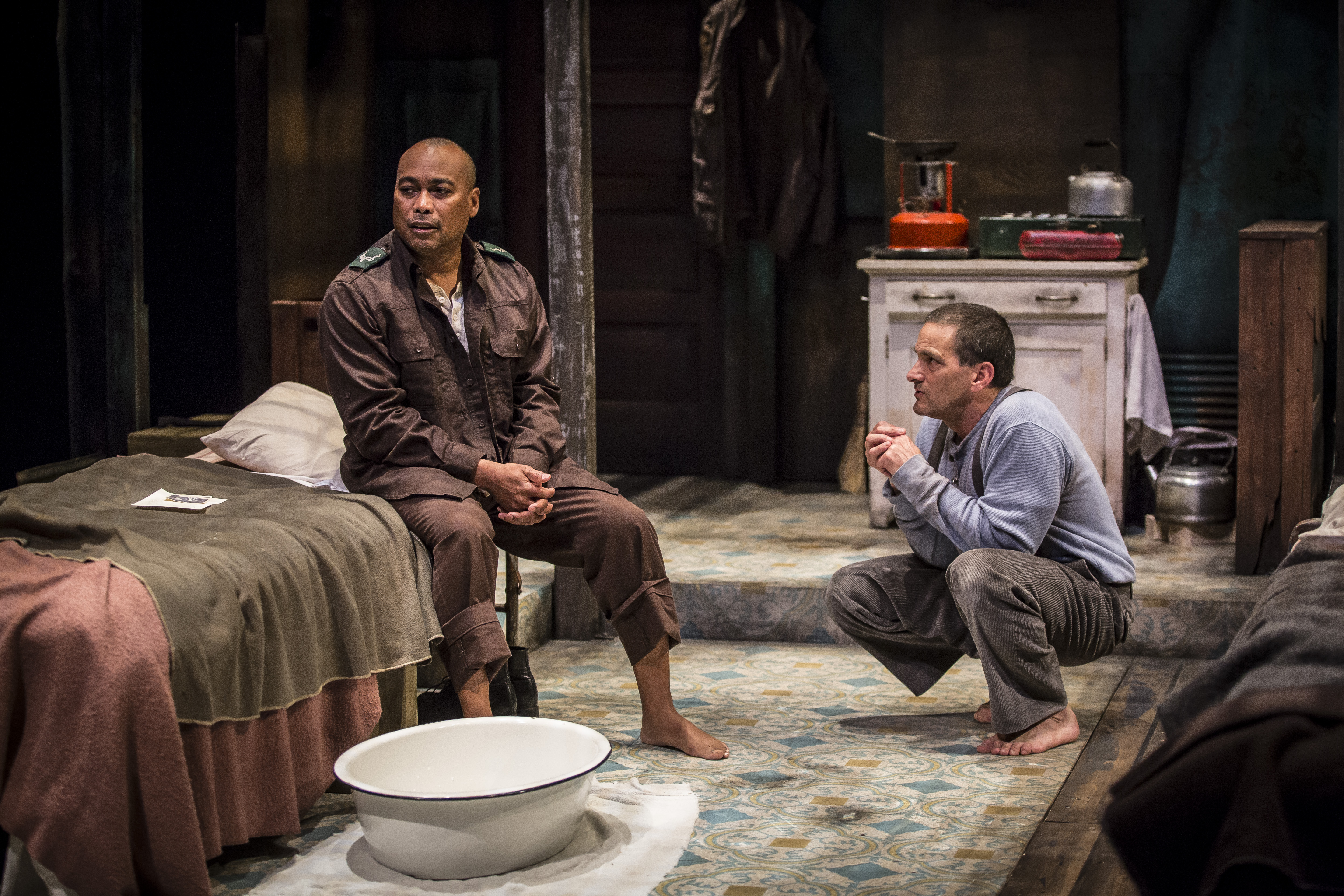
The two also recall John Steinbeck’s Of Mice and Men, another parable about two apparent losers in life. Whereas Steinbeck’s slow-witted Lenny habitually looks to the future as a dreamer-fool, Morris calculates obsessively for the shared future of the two brothers, fully sensing how fragile that is. Yet he takes pleasure, even short-lived vicarious delight, in penning little love letters for his brother’s response to a white woman’s personal ad. Remember, this is apartheid South Africa.
“What you have thought, that’s the crime,” Morris warns his brother. “They’ve got ways and means, mean ways.”
Bible-quoting Morris is so deeply repressed that, when his brother asks him whether he’s ever been with a woman, he curls up like a flower burning into an ash.
Fugard richly weaves together symbolic objects, including an all-white suit that Zachariah buys with all the money his brother has squirreled away for their future. At this point, the layered complexity of their relationship unfurls, from teasing to playful exuberance, to turning inside out, so we see truth more clearly.
Finally, the play evoked W.E.B. Du Bois’ famous explanation of the “double consciousness” a black man must endure in a society that refuses to see him as a man. Du Bois himself was a rather light-skinned black man, well-educated and capable of passing as white. In this play, Morris carries such tricky “passing” consciousness with the weary endurance of Sisyphus. His brother signifies his potentially liberated spirit, the brother for whom life is too cruel.
Rarely have two so seemingly different brothers been bound together in a “blood knot” that might burst their hearts. And yet, Fugard resists any easy summation, because his ashen lyricism never really rests.
Listen to Morris, obliquely affirmative, near the end:
“Yes, It’s the mystery of my life, that lake. I mean. . . It smells dead, doesn’t it ? If ever there was a piece of water that looks dead and done for, that’s what I’m looking at now. And yet, who knows? Who really knows what’s at the bottom?”
_________
Like this:
Like Loading...




